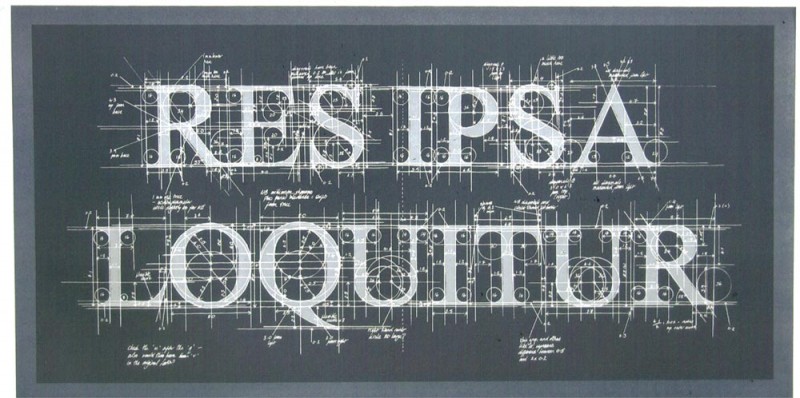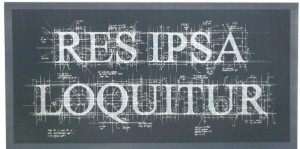In this blog post, Disha Pareek, a student of RGNUL, Punjab, critically analyses the principle of Res Ipsa Loquitor.
Res Ipsa Loquitor is a legal term which means ‘the thing speaks for itself.’[1] It is a very popular doctrine in the law of torts; it is circumstantial or indirect evidence which infers negligence from the very nature of the accident that has taken place and there is the absence of direct evidence against the defendant. Res Ipsa Loquitor is applied when it can be said that without the defendant being negligent, the accident would not have happened.
Background
Accidents happen all the time and many a time, it is because of someone’s negligence. And in the law of torts, to prove somebody’s negligence, the burden of proof is on the plaintiff, that is, someone who is the victim of the tort. It becomes really difficult to prove that the defendant was at fault and also to gather evidence against his act or omission. Therefore, keeping this in mind, the principle of Res Ipsa Loquitor came into force under which a plaintiff can use circumstantial evidence to establish negligence.
Elements of Res Ipsa Liquitor
Before claiming the tort of Res Ipsa Loquitor, a plaintiff must meet a few requirements to claim compensation
- The event that caused injury to the plaintiff does not occur unless someone has acted negligently.
- The evidence adduced rules out all the possibilities of the fault of the plaintiff or third party.
- There is a duty of care of defendant towards the plaintiff which he breached.
Development of the principle
The roots of the principle are in common law countries, which are England in the case of Byrne v. Boadle. The facts of the case were that in 1863 in England, a barrel of flour fell from a two-storey building and hit the plaintiff’s head, but the plaintiff could not acquire direct evidence against defendant to allege negligence on his part. But the court held the judgment for the plaintiff and opined that the circumstances were different in this case, and there could be a presumption of negligence.
Distinction between Res Ipsa Loquitor and prima facie
Prima facie evidence just tends to prove if a certain circumstance could or could not have occurred. It is not conclusive in nature and hence, is true only till it is rebutted and so in any given case, it just tends to state that for a given situation there is enough evidence to prove the liability but does not prove the liability of it. But Res Ipsa Loquitor states that facts are evident of the liability as there cannot be any other probable cause for the same.
Hence, the keynote difference between the key doctrines states that while prima facie aims at providing the evidence to prove liability, Res Ipsa Loquitor states that it is reasonable that liability lies with the defendant and hence, no further evidence is required to be furnished. But both the doctrines are rebuttable in the sense that the defendant may prove the case in opposite to the stated evidence and hence negate the applicability of the doctrines.
Essentials of Res Ipsa Loquitor
-
Inference of negligence
For the element of Res Ipsa Loquitor to be made applicable in any case, the accident should be such as which could not have happened if ordinary course of things had happened without negligence. For instance, a barrel of flour cannot randomly fall on someone’s head if the party is reasonably careful. And also, a Clock tower in the heart of the city will need extra care and if it falls and causes injury to several people, the defendants will but obviously be held liable for the same under this principle. In such cases, direct evidence of proving negligence is not important, but the plaintiff has to establish a prima facie case, either by direct or circumstantial evidence of defendant’s negligence.
-
Exclusive control by defendant
The thing that has caused the damage must be under the direct control of the defendant or his representative. It is not always necessary that all the circumstances are under the defendant’s control, but if the events leading upto the accidents were under the control of others besides the defendant, then the mere happening of the accident is insufficient evidence against the defendant. For instance, if a surgeon at the time of the operation leaves a mop inside the patient’s abdomen, here the doctor had exclusive control over the patient’s health and so, therefore, he would be liable under the principle of Res Ipsa Loquitor.
-
Freedom from Contributory Negligence
The third essential for the principle is that the plaintiff or any third party did not cause or contribute to the injuries suffered by him. If it is found that the plaintiff or third party contributed to the act that caused damage to the plaintiff, then the principle shall not apply.
Once these elements are established, there is a possibility that courts treat it as a possible assumption of negligence on the part of the defendant. Normally, following this the jury in question presumes that the defendant is liable. The jury, however, is not bound to presume such things. In such cases, the burden of proof is on the defendant that he was not negligent. Thus this principle is rebuttable and if the defendant can successfully rebut the claim of negligence, he will win the case. Otherwise, he shall be made liable.
Landmark case-laws
-
Scott v. the London and St. Katherine Docks Company[2]
The facts of this case were that plaintiff was an officer of Customs. He was instructed to go from the East Quarry to Spirit Quarry by his surveyor. There were warehouses on the Spirit Quarry. He went to the entrance of one of the warehouses to find Mr. Lilley, the Surveyor. He was told that Mr. Lilley is in another Warehouse. He went to the first door to meet upon the Quarry. He went into the Warehouse and met a labouring man about two yards within warehouse. He enquired from the Labourer about Mr. Lilley, and he was informed that he could find Mr. Lilley in the next doorway. In passing from one doorway to another, six bags of sugar fell upon him, and he suffered injuries as the servants of the dock company were lowering the bags of sugar. Except plaintiff, there was nobody else on the spot of the accident. There was no warning signal and no fence or barrier. The majority of the Court came to the conclusion that falling of bags of sugar on the plaintiff itself is not reasonable evidence of negligence and directed the case for a new trial.
-
Rampeary and Another v. Jai Prakash and Another[3]
In this case, the injured/plaintiff was a minor girl about nine years who was passing by the road on its left side along with her mother. Defendant was playing in the middle of the road. Another defendant was sitting on the rod of the cycle. Suddenly, the cyclist turned his cycle on his wrong side (to his right side) and collided with the minor as a result of which she suffered compound fractures in two of her bones in the right leg with other bleeding injuries.
The pleadings of the minor were that she suffered injuries due to negligence on the part of the cyclist and defendant No.2, and they are liable for damages. Both the defendants denied the contentions. Trial Court discussed the entire evidence and decreed the suit for the sum of Rs.567/-. The Ld. First Appellate Court set aside the judgment of Ld. Trial Court and dismissed the suit by holding that the plaintiff failed to lead satisfactory evidence of negligence which can be said to be a proximate cause of accident and injury to her. However, the Ld. First Appellate Court awarded her Rs.300/- towards expenses for her treatment. The injured/plaintiff approached Hon’ble Patna High Court. Hon’ble Patna High Court (Second Appellate Court) set aside the judgment of Ld. First Appellate Court and remanded the case for fresh decision.
-
State of Punjab v. Modern Cultivators, Ladwa[4]
The facts of this case were that plaintiff Modern Cultivators suffered losses due to flooding of its land as a result of a breach in a canal belonging to the State of Punjab. The Trial Court awarded damages and decreed the suit which was upheld by the First Appellate Court and in Second Appeal by Hon’ble High Court. However, High Court reduced a number of damages. Both the parties approached Hon’ble Supreme Court. The Hon’ble Apex Court held the defendant was negligent by applying the rule of Res Ipsa Loquitor.
Footnotes:
[1] Available at http://dictionary.law.com/Default.aspx?selected=1823
[2](1865) 159 E.R. 665
[3](2 Camp. 79)
[4]1965 AIR 17, 1964 SCR (8) 273
 Serato DJ Crack 2025Serato DJ PRO Crack
Serato DJ Crack 2025Serato DJ PRO Crack













 Allow notifications
Allow notifications


